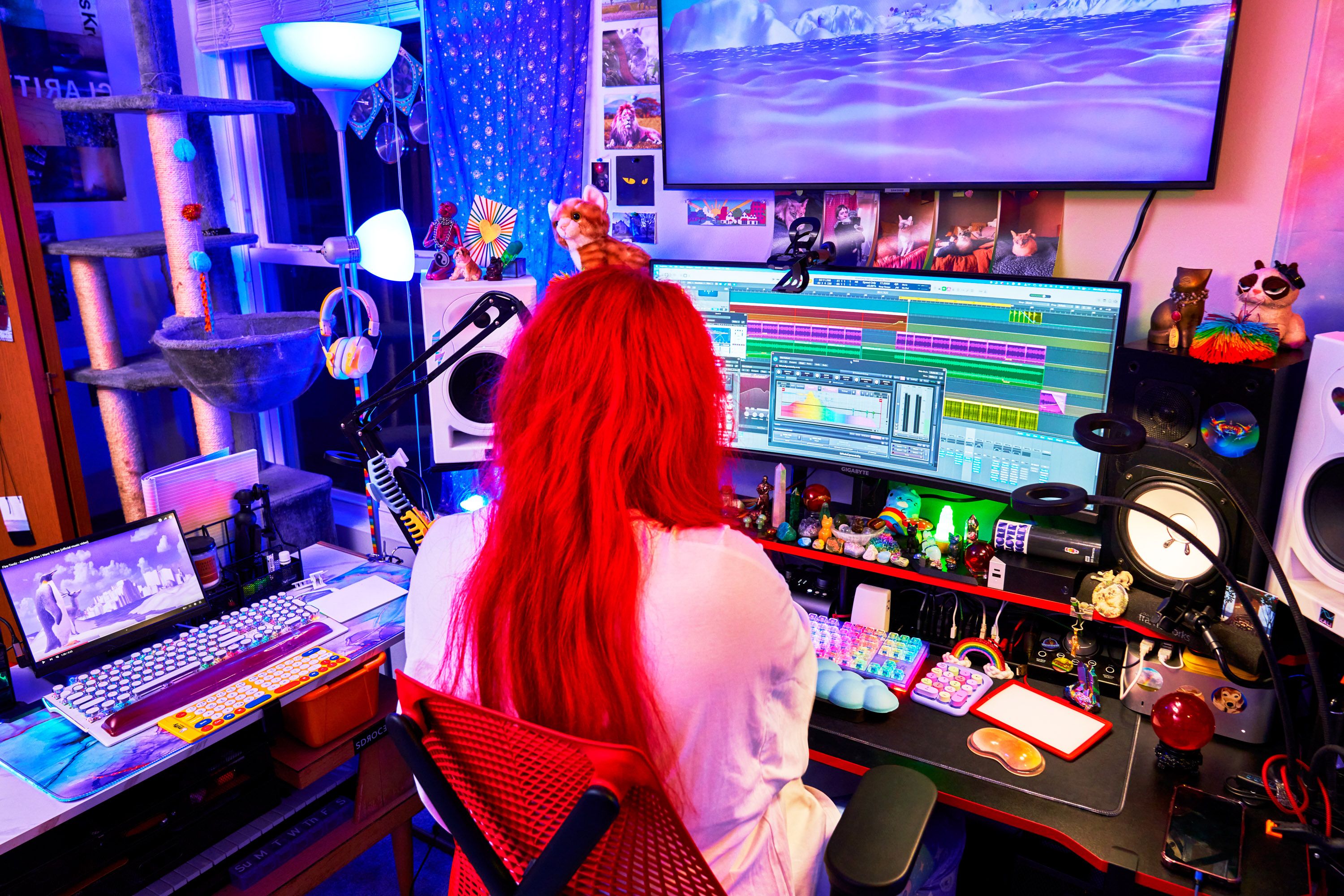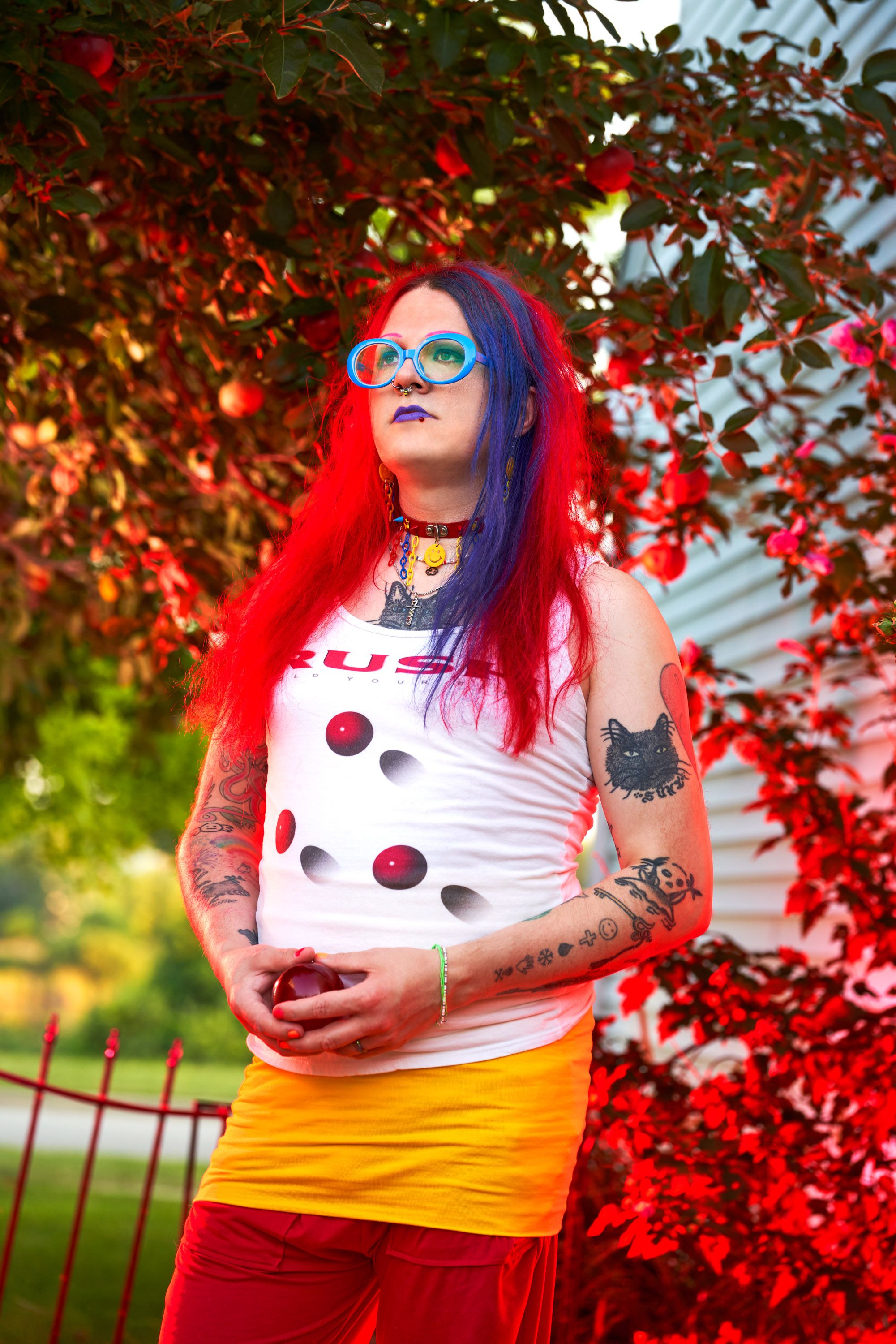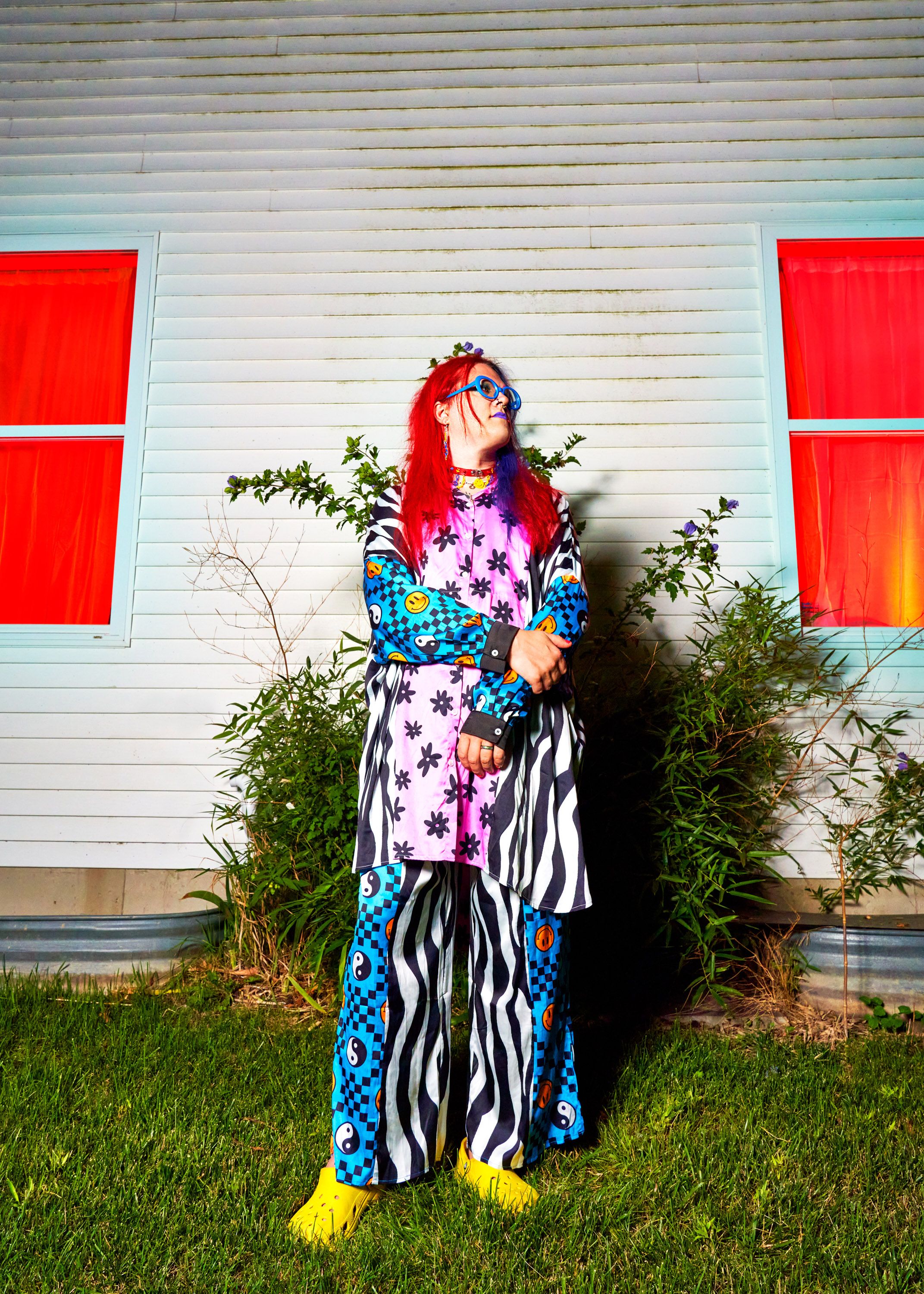Every Day Is One More Day To Get A Fire-Toolz Song Together
Bailey Slater

50 shooting stars racing across the sky, a falling meteor so gargantuan it could decimate a city, the first spit of orange mass that precedes volcanic eruption. None of these natural phenomena quite pack the punch of a Fire-Toolz track, but they sure do try. One of the many sprawling musical projects helmed by Chicago-based musician and artist Angel Marcloid over the years, this title has come to be synonymous with a certain breed of sonic chaos – raucously melding IDM, 90s emo and ambient mall-wave into a state of near total anemoia.
Attempts at debunking this sonic sorcery are near-impossible, believe me, I’ve tried. This is because Fire-Toolz exists in the antithesis of such a framework, a project that sends genre to meet the grisliest of demises and exists to be heard beyond the unplayable limbo of a video game map.
For the faint of heart, beaming into the artist’s studio over Zoom could constitute a form of aggressive shock therapy. Marcloid, with her two-toned hair and thick-rimmed glasses, has fashioned a visual wonderland overwhelmed with stimuli, from polka-dotted trinkets and rainbow plushies to walls lined with large tapestries of cosmic realms and mock-Windows XP flower gardens. A cluster of guitars and pedals sit in the corner beside an empty cat bed, facing a vast monitor setup where the artist works her magic. In mock affection, Marcloid contemplates adding a neon light adorned with the words “man cave” to the flurry.
This nest, of course, is a total sum of its parts – the hub of an unabashed musical hyphenate, whose work spans that of multi-instrumentalist, remixer, producer, designer, editor, composer, and mix engineer. Marcloid’s prolific drive was evident even in adolescence, where she lived another life moonlighting as the mogul of a band merch empire named Black Sea during the boom of MySpace. “I always knew I wanted to work for myself,” she teases. “It was a clothing line then, but now it’s mixing and mastering for other artists.”

Born in 1984 to hippy parents who’ve since grown into lite-conservatism in their elder years, music has been an integral part of Marcloid’s life ever since she learnt to smack a beat out of the pots and pans in her home kitchen. The artist recalls the rabble of her rock-n-roll family with fondness, detailing how her mother weaned Marcloid and her sister, a photographer and musician, on staples from Elton John, The Beatles and U2, while her father’s skills as an electronics whiz and former live technician for classic rock bands would prove useful down the line in documenting many an adolescent jam session.
As a teen, she came up through the hardcore band scene of her native Baltimore, trying her hand at pretty much everything – including a 3-piece psychedelic wall-of-sound space-emo group named Shadow Government, which is just as red-pilled as it sounds. Out of the many outfits that followed, Marcloid’s experiments now live on through active monikers such as Mindspring Memories, which dabbles in the comforts of strung-out ambience, Nonlocal Forecast, a sort of manic take on the soundscapes you’d expect from a Sonic the Hedgehog speedrun, and Angelwings Marmalade, a rough exercise in avant-garde noise rock.
“Fire-Toolz is definitely the most reach I’ve ever had,” surmises Marcloid of her decision to centre her output around this name, “and the busiest and most dedicated I’ve been to music too.”

At some point in early adulthood, she began making music with computers, and her approach to creating has pretty much been the same since. “I don’t go into it with that much of an idea,” she explains, “it’s really just a free for all – I fuck around until something starts to take shape.” Though the sonics between her first and latest album feel worlds apart, united somewhat tentatively by layers of cinematic synths and screamo-warbling, Marcloid is always open to the elements or sudden bursts of the divine.
An average studio session might consist of sifting through old demos or mounds of field recordings gathered in the preceding months to get a feel for what is about to pour out, taking to her Korg synthesisers or improvising a glam-rock guitar riff soon thereafter.“Sometimes I’ll go with one thing, like this [track] should start with a blast of feeling right away, and really catch people off guard,” she says. “But that’ll be all I’ve got.”
How noisy or melodic this one scrap of sound will become is then a mystery, revealed only after an uninhibited exhausting of all available options, a process that sounds far less lively than its actuality. Marcloid likens it to deciding what to wear in the morning, or even the way she uses LEGO. “When I was a kid I would buy all these kits and never, ever build them. I would just make my own shit. That’s how I’ve always been.”
With 13 full releases under her belt using the Fire-Toolz moniker, from 32-track remix dossiers to 4 disc albums full of experimental noise work, one wonders if Marcloid sees an end to the project. Would she ever pack it all in for a simpler life’s mission, perhaps a stint as a cattle herder? “I’m kind of in my go-to-the-mountains phase already,” she admits, having settled quite comfortably into married bliss in the Chicago suburbs with her wife, family of pets and the gang of honking geese that run the lake by her house. “That’s retirement behaviour, and I’ve wanted to retire since I was a teenager.”
In all seriousness, Marcloid believes that the flames of creativity burning inside will never stop, fanning themselves on the breeze emitting from her PC when it’s running on all cylinders. Sure, there might be months where the drive to create wanes, and she instead tends to her business, or embarks on a spell of intense graphic design for months at a time. Even during our call, the artist suddenly remembers an unfinished video for a project released in 2018 that she should probably get around to completing, proof that her life’s work is never really done. “I always tell people, if I die, you have to release all the shit on my hard drive. Go through all of it, find everything that’s not out there even if it’s mixed like shit or unfinished or whatever,” she says. “I’d be so pissed if I did all that work [for nothing].”
In this way, the Fire-Toolz project is something ever-evolving, a chameleon forever searching for new and exciting terrains, unwilling to be anchored to the past. It’s a philosophy that makes Marcloid a conductor for the new and now, as Lipsticism’s Alana Schachtel would find out after soliciting her for her mastering services via the musician’s company, Angel Hair Audio. The pair soon formed a fast and trusting relationship based on their work, and, earlier this year, Marcloid surprised the artist by reimagining one of her then-unreleased cuts, “All The Time”, and infusing it with a newly soft and acoustic sensibility.
“It had such a strong impact on me, I was really wowed by how she took the original song and made the emotion really different and so potent,” shares Schachtel. “She also did it so quick which was stunning to witness. I’m in awe of her creative mind and output everyday.” What enamours her most about Marcloid is her unfiltered intuition, and how this has encouraged her to take creative risks in her own art. “Her work is so genuine,” she says. “Angel is the type of artist who is really giving her listeners a wide open door to her world, there is such a beautiful vulnerability to her artistry that is touching, inspiring, and beguiling to witness.”

Amongst the many creative partnerships Marcloid has forged over the years, like that of her and Schachtel, one of her most longstanding relationships is that with Hausu Mountain. Acknowledged on Drip Mental, Marcloid’s first release with the Chicago-based imprint as “the thing that happens when their aromas combine”, Doug Kaplan and Max Allison’s label has been championing the best off-kilter electronica, from Eartheater to Moth Cock, for over a decade. The duo have a particular affinity for art that smashes distinctions between high and low culture, bringing with it the idiosyncratic perspectives of their makers.
“We were both familiar with Angel's work to some degree in her days as an underground noise artist with dozens of different project names, more closely aligned with the harsh noise / power electronics type of circles,” Allison shares over email, “but it wasn't until we heard her album Even The Files Won't Touch You, that we really got a chance to see just how incredible of an artist she is.”
Allison describes the project & the glitchy, self-made music videos that followed as "completely mind-melting", realised with a diehard DIY spirit that blurred Marcloid’s kaleidoscope of references and predilection for chaos into something entirely new and unquantifiable. “We could point to individual elements of her sound, like the progressive rock/jazz-fusion shredding or the piercing black metal vocals and the all-consuming synth noise, as factors that personally resonate with us but the real joy is hearing all of those things come together into the full, overwhelming package.”
All those operating in Marcloid’s orbit are at pains to mention the incredibly visceral world the artist shapes not just with her sound, but a wide-reaching approach to design too. A track like 2018’s “In The Computer Room @ Dusk ☕️” typifies such an experience. From the depth of each synth and the potent rumbling of a neighbour’s lawn mower purring faintly outside the door of her studio, to the heavily stylised track title bearing a coffee emoji and remix from an alias within the Fire-Toolz sonic universe. These details speak to years of meticulous world-building, flirting with the nostalgia of old internet design via pixelated 3D renderings and metaphysical objects that look like they belong in the galaxy brain meme series, to project something new and uncanny into the world.
The latter is part of a devout air of spiritualism which unfurls across the spectrum of Marcloid’s work. It’s a path with many peaks and troughs, with Marcloid detailing a near-total rejection of the low-stakes Christianity of her upbringing and subsequent return by way of a religious youth group. This was followed by more rejection, Richard Dawkins style, to a gradual embrace of the self-help principles prevalent in secular Buddhism and further research into traditions of ancient Hinduism.
“When I started to get a feel for spirituality again by discovering Buddhism, that's around the time that I started doing Fire-Toolz,” Marcloid tells me. “It was showing up in my music then, as Buddhist teachings here and there, even in clips of monks talking, or a YouTube video on how to meditate. As my interests have been evolving, the music has just recorded that process.” Now, a study bible sits in the same room as her guitars and monitor, something Marcloid feels pained to admit.
Learning of these original translations from her spiritual forebearers – “which is so far away from what any pastor in the church down the street will tell you now,” – has made her spiritual journey much more exciting, constituting its own form of self-help in the process. “When you start getting closer to the truth,” she says, “things just start to feel better.”
“I'm excited for every additional day that I'm alive – because I know that it's one more day to get a song together,” says Marcloid. “I have so much more to say, I have so much more to express. And I've never felt like I was anywhere near completing that.”
